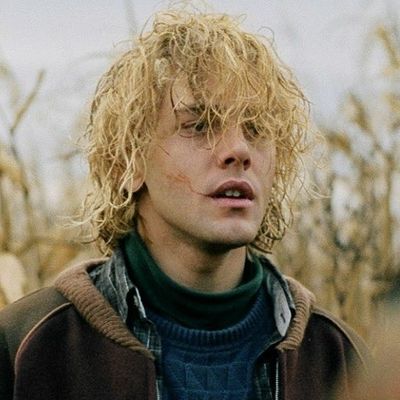
The┬áenfant terrible┬áof Quebecois cinema Xavier Dolan has made a name for himself among critics and festival audiences with such stylized, emotionally extravagant films as the epic trans romance┬áLaurence Anyways┬áand the in-your-face family drama┬áMommy. But it turns out he can direct a mean thriller as well. Well, sort of.┬áTom at the Farm, adapted by Dolan and Michel Marc Bouchard from BouchardÔÇÖs own play, has the outward trappings of a genre piece. And as such, itÔÇÖs fairly suspenseful. But at heart, itÔÇÖs still very much an Xavier Dolan film ÔÇö ragged, explosive, and often moving.
The story concerns Tom (Dolan, looking like he stole Meg RyanÔÇÖs hair from┬áCity of Angels), who arrives at the rural family home of his deceased boyfriend Guillaume to attend a memorial service. But he learns that GuillaumeÔÇÖs mom, Agathe (Lise Roy), doesnÔÇÖt know that her son was gay; she thinks he had a girlfriend and that Tom was just a close pal. Her other son, Francis (Pierre-Yves Cardinal), a strapping brute and a homophobe, knows the truth and doesnÔÇÖt want his mom to find out. In the filmÔÇÖs most touching couple of scenes, Tom, who had been invited to eulogize Guillaume, keeps quiet during the service, after having realized he couldnÔÇÖt say what he came to say; later, he tries to utter some version of his intended words in private, pretending that theyÔÇÖre what GuillaumeÔÇÖs girlfriend might have said were she there. All throughout these scenes, Francis keeps a close eye on Tom, but thereÔÇÖs more than a hint of latent attraction here as well: FrancisÔÇÖs threats are always uttered in close quarters, with an uneasy mix of intimacy and aggression.
That uncertainty is where┬áTom at the Farm┬ádraws much of its suspense. ThereÔÇÖs no mystery here, no family secrets to unearth or startling climax to build toward; a revelation of sorts at the end is more a confirmation than a twist. Instead, what fascinates us is whether Tom will survive his days in the country without revealing to Agathe the true nature of her sonÔÇÖs sexuality, and before Francis gives in to his base urges ÔÇö and whether those base urges are fundamentally sexual, or violent, or some combination of both. That Tom keeps finding himself unable to leave, despite the fact that his presence there is causing him physical harm, hints at a dark attraction within him as well.
But oddly enough, Tom at the Farm avoids the typical narrative games of self-preservation. Dolan often keeps the camera fixed on himself (nobody shoots Xavier Dolan like Xavier Dolan), as Tom drives around, the push-pull of attraction and repulsion, fear and desire, playing on his face. His conflict is palpable, as he keeps both his emotions and the truth at bay. That makes for a surprisingly gripping film: an anti-thriller thriller about preserving secrets rather than unearthing them, about repressing desires rather than revealing them.


